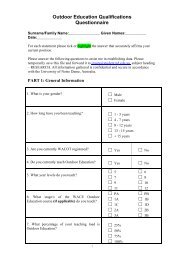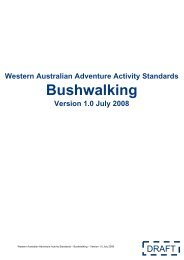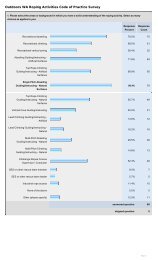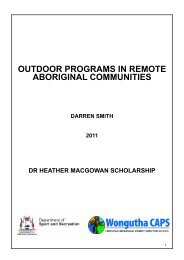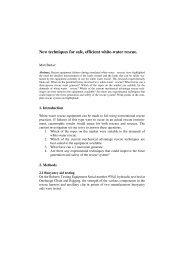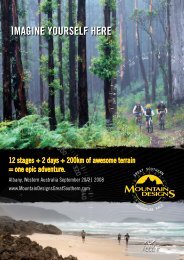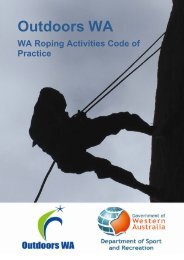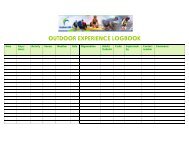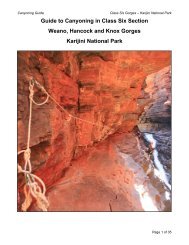Outdoor Adventure Activities Benefits Catalogue - Outdoors WA
Outdoor Adventure Activities Benefits Catalogue - Outdoors WA
Outdoor Adventure Activities Benefits Catalogue - Outdoors WA
You also want an ePaper? Increase the reach of your titles
YUMPU automatically turns print PDFs into web optimized ePapers that Google loves.
The economic benefits of outdoor adventure activities are shown to be important for both theindividual (improved health and wellbeing and therefore lower health care costs) and thecommunity (income from tourism and recreation ventures). Additionally, the value peopleattribute to outdoor activities, purely as a result of doing them, can also be of benefit toindividuals and communities.6.2. Future ResearchThe Australian and New Zealand research exploring the benefits of outdoor adventureactivities is generally of sound quality and is growing in quantity. More Australian and NewZealand research across the spectrum of the outdoor field is needed however to address thegaps identified in the preparation of this report. These gaps are evident in the areas ofresearch scope and methodology, and can be explained by the size of the research communityand the youth of the outdoor field in Australia. Additionally, gaps exist due to the lack ofstrategic research agenda within which researchers, policy advisors, organisations and otherstakeholders may locate their research, add to the broader knowledge based, contribute tofilling some of the research gaps and to ultimately add to the benefits achieved throughparticipating in outdoor adventure activities.• Setting the research agenda: An interdisciplinary research workshop, supported by keystakeholders, would assist in generating a research agenda for the future. This agendacould considers needs at the organizational, local, community, state and national levelsand seek to develop cross-community, interdisciplinary and international researchnetworks. This workshop would also assist identifying how each sector of the broadoutdoor industry may benefit from one another, thus increasing the research capacity.• Research scope: It is evident that more data need to be collected and analysed inAustralia regarding the outdoor field, such as sector specific data e.g. number oforganisations, employees/volunteers, participants, participation days, participation ineach activity; fiscal value to the local and broader economy; and other operationalareas. It is recommended that the scope of research should be integrated across stateand national boundaries; social (e.g. health, wellbeing, justice issues), environmental(e.g. impact) and economic (e.g. size of industry, health benefits); and a comparativeapproach taken across countries. This could also include interdisciplinary researchsuch as between health and outdoor education, recreation planning and anti-socialbehaviour programs.• Research methodology: The authors concur with the recommendations by Neill andRichards (1998) who call for ‘more detailed description of how programs areconducted and investigation of the role individual differences, such as personality andcoping styles, have on outcomes’ (p.1). In addition, there is an urgent need forlongitudinal research that assesses the ongoing benefits for individual involvement inphysical activity beyond the life of the activity or the program. This could alsoinvestigate how benefits are transferred and sustained in participants’ lives upon theirreturn.It is recommended that research funding into the benefits of outdoor adventure activities beprocured to further the development of research scope and methodologies that begins to fillthese gaps and support the ongoing development and achievement of outdoor adventurePage 25






